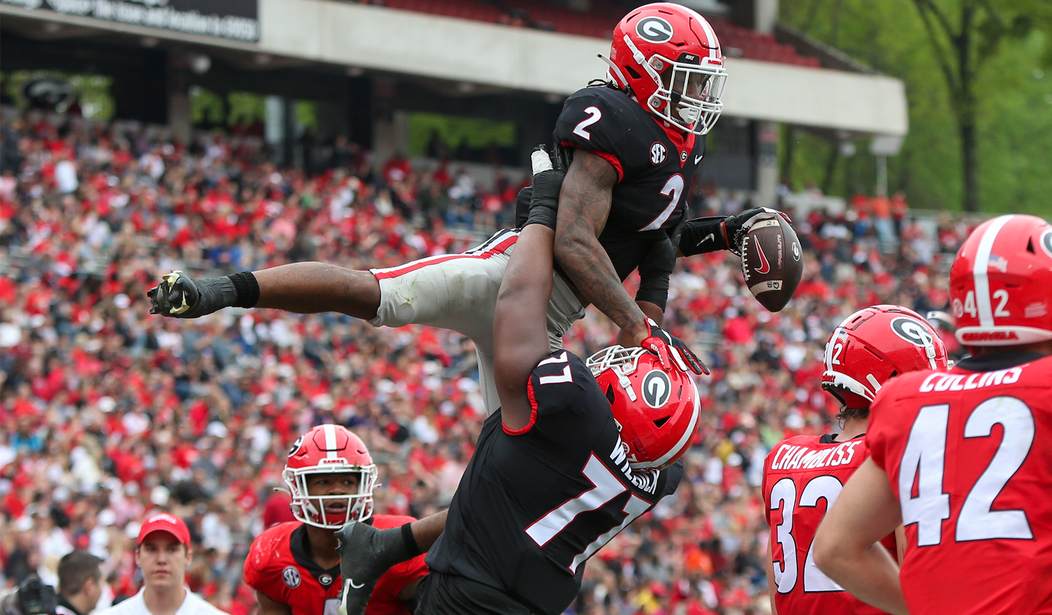In the early hours of Jan. 15, a horrific crash claimed the lives of University of Georgia football player Devin Willock and football team staffer Chandler LeCroy. Another player, Warren McClendon, and another staff member, Tory Bowles, sustained injuries in the wreck, which took place just hours after the team celebrated its second consecutive national championship in front of tens of thousands of jubilant fans.
An entire fanbase is grieving the loss, not to mention the families and loved ones of these two young people who didn’t have to die. There are a lot of questions surrounding the crash. While we know speed was a factor, toxicology reports may be weeks away. An overzealous ambulance-chasing attorney who sponsored Willock in a NIL (name, image, and likeness) deal announced a press conference last week involving potential legal action from Willock’s family, only to read a fairly anodyne statement about the family’s grief.
But the most astonishing coverage in the aftermath of the deadly accident has come from the Atlanta Journal-Constitution (AJC), the newspaper that has a monopoly on coverage in the city. The AJC long ago abandoned any pretense of objective coverage and is yet another left-leaning newspaper, but it has now thrown out any notion that it’s a responsible journalistic outlet.
(Full disclosure: I’m an alumnus of the University of Georgia, an unabashed supporter of all its athletic programs, and a donor to the school and its baseball program.)
On Sunday, the AJC published an article with the headline, “Strip club visit raises questions about fatal UGA crash.” The lede paragraph: “A late-night visit to a strip club preceded a car crash that killed a University of Georgia football player and an employee of the school’s football program, raising questions about boundaries between the program’s staff and its athletes.”
The article reconstructs a supposed timeline in the last half hour or so before the crash, relying on security camera footage from Athens-Clarke County that shows a group of players and staffers leaving a downtown strip club called Toppers. The article also references social media posts and “interviews,” but the reporters engage in a good bit of questioning and speculation.
“The video, social media posts and interviews provide the most complete understanding to date of events that culminated with the single-car crash,” write reporters Dylan Jackson and Alan Judd. Sure they do — in the best TMZ fashion possible.
“Many questions remain unanswered, however,” Jackson and Judd continue. “Foremost among them: Why were two university employees out with two student-athletes at such a late hour, riding in a rented vehicle like those the football program uses to transport potential recruits?”
While these are questions that are worth asking, the tabloid nature of the report buries them in a lot of detail that doesn’t matter. Maybe the AJC is trying to suggest that alcohol was a factor in the accident. If so, why is it such a big deal that the group visited a strip club? I’m not justifying such behavior, but LeCroy, the driver, could have gotten drunk at any number of bars in downtown Athens. To make a specific deal out of the group going to Toppers is merely sensationalist reporting.
Related: USA Today Pitching ‘Anti-Asian Hate’ Long After They Knew the Killer Was Asian
The article also goes into thinly veiled criticism of the football program’s recruiting methods. Under Coach Kirby Smart, the University of Georgia has upped its recruiting game with increasingly lavish tactics — which are highly effective and fall within NCAA guidelines. For the AJC to question whether LeCroy’s use of a university vehicle was legitimate is understandable, but to cast aspersions on the recruiting program is, again, irresponsible.
The AJC‘s managing editor, Leroy Chapman Jr., made things worse by publishing a justification of the tabloid “journalism.” In a piece called “Why we’re writing this story,” Chapman justified the ideas behind the story but not the salacious nature of the article.
Chapman wrote, in part, about “asking accountability questions”:
LeCroy was driving a rental car. The university rents such vehicles to drive recruits on campus visits. Police say speed contributed to the accident. Why the four occupants of the SUV wound up together that night is important to understand. Those facts will determine who is ultimately accountable and what role the university’s decisions and policies might have played. The university is responsible for ensuring the safety and well-being of student athletes.
Those questions of accountability are worth asking, and I’m sure the university will deal with them. But that doesn’t justify the whole angle of, “look, they were at a strip club!”
And, speaking from the perspective of an editor here at PJ Media, part of an editor’s job is to stand behind his or her writers when the need arises, but Chapman never addressed the problem that most people have with the article, which is the sensationalism throughout the piece.
As a friend of mine put it on Twitter, “If you have to issue an article explaining why you wrote an article, you might be sh***y at journalism. Looking at you, @ajc.” To my friend’s colorful language, I might add “shameful.”
It’s one thing to ask the questions that need to be asked at a time like this — after all, journalists at newspapers like the AJC and writers at plucky sites like PJ Media do it all the time. But it’s another thing to bury those questions under tacky tabloid reporting. In doing so, reporters Jackson and Judd, editor Chapman, and the AJC as a whole not only sacrifice their integrity but also disrespect these grieving families.










Join the conversation as a VIP Member